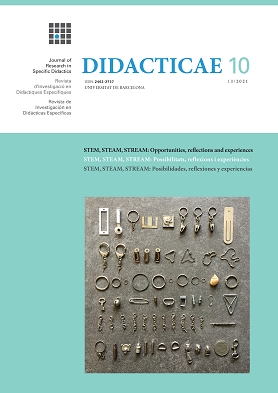Aprender y crecer con STEAM: una experiencia de diseño en el jardín de infancia
Learning and growing up with STEAM: A project experience in kindergardenIN THE KINDERGARTEN
DOI:
https://doi.org/10.1344/did.2021.10.21-36Keywords:
STEAM, participative practices, kindergarden education, preschool educationAbstract
This paper presents an educational intervention considering the social function of education and the need for an integrated pedagogical approach in kindergarten education for the holistic development of the child, built and streamlined within the framework of initial training and professionalization of childhood educators. The project “Let’s discover Princes and Princesses ... Castles and Dragons” is based on a childhood pedagogy that values the primacy of the child’s voice, active builder of their own learning path, designed in a dynamic of integrative (inter) action centred on the STEAM approach. The data collected for this case study highlights the contributions of the project anchored in the STEAM pedagogy for children’s learning and for a reflexive action with a strong formative tendency for the involved educators. From this proposal, it was possible to understand the action (not sure about this) of STEAM considering the children’s agency, placing them as the main element of the pedagogical action, based on problem solving. On the other hand, it was possible to verify the promotion of learning through the methodology at the cognitive level, with the development of innovation, involvement, creativity, teamwork, and communication.
References
Amado, J. (2014). Manual de investigação qualitativa em educação. Imprensa da Universidade de Coimbra.
Carmo, H. y Ferreira, M. M. (1998). Metodologia da investigação: Guia para Auto-aprendizagem. Universidade Aberta Circular n.º 17/DSDC/DEPEB/2007 - Gestão do Currículo na Educação Pré-Escolar. Lei Quadro da Educação Pré-Escolar n.º 5/97 de 10 de fevereiro. Diário da República n.º 34 – Série I-A. Assembleia da Républica.
Diniz, M. (2001). Resolução de Problemas e Comunicação. En K. Smole, M. Diniz, C. Cavalcanti, C. Chica, E. Milani, P. Candido y R. Stancanelli (Eds.), Ler, escrever e resolver problemas: Habilidades básica para aprender matemática (pp. 87-97). Artmed.
Kowalski, I. (2008). … e a Expressão Dramática. Instituto Politécnico de Leiria, Escola Superior de Educação de Leiria
Marchão, A. d., Porto, S. y Coelho, T. (2019). Abordagem pedagógica integrada na educação pré-escolar: o projeto KiitoS@21st Century Preschools. Investigar em Educação (9/10), pp. 105-119. http://pages.ie.uminho.pt/inved/index.php/ie/article/view/160/160
Mendes, M.F. y Delgado, C.C. (2008). Geometria: Textos de apoio para educadores de infância. Direção Geral de Inovação e Desenvolvimento Curricular (DGIDC).
Mengmeng, Z., Xiiantong, Y. y Xinghua, W. (2019). Construction of STEAM curriculum model and case design in kindergarten. American Journal of Educational Research, 7(7), 485-490. https://doi.org/10.12691/education-7-7-8
Oliveira-Formosinho, J., y Formosinho, J. (2013). A perspetiva educativa da Associação Criança: A Pedagogia-em-Participação. En J. Oliveira-Formosinho (Ed.), Modelos curriculares para a educação de infância: Construindo uma práxis de participação (pp. 25-60). Porto Editora.
Papalia, D. E., Olds, S. W., y Feldman, R. D. (2001). O mundo da criança. McGraw-Hill, LDA.
Santinha, M. E. (2004). A prática da expressão plástica no jardim de infância. Ensinarte: Revista das Artes em Contexto Educativo, 43-65.
Sharapan, H. (2012). From STEM to STEAM: How Early Childhood educators can apply Fred Rogers’- approach. Young Children, 67(1), 36-40.
Silva, I. L., Marques, L., Mata, L. y Rosa, M. (2016). Orientações Curriculares para a Educação Pré-Escolar. Ministério da Educação / Direção Geral da Educação (DGE).
Downloads
Published
Issue
Section
License
Copyright (c) 2021 Diana Filipa Martins, Nídia Alexandra Mesquita, Maria José Gamboa

This work is licensed under a Creative Commons Attribution-ShareAlike 4.0 International License.
The authors who publish in this journal agree to the following terms:
- Authors retain copyright and grant the journal the right of first publication.
- Submitting a paper does not involve paying any fees.
- Texts will be published under a Creative Commons Attribution Share-Alike 4.0 International License that allows others to share the work, provided they include an acknowledgement of the work’s authorship, its initial publication in this journal and the terms of the license.
- When citing works published in Didacticae, both the autor and the journal must be cited.
- Didacticae does not accept any responsibility for the points of view and statements made by the authors.



